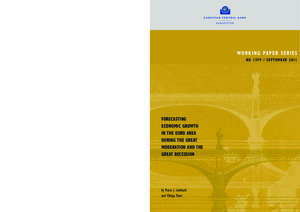Forecasting economic growth in the euro area during the Great Moderation and the Great Recession
"We evaluate forecasts for the euro area in data-rich and ‘data-lean’ environments by comparing three different approaches: a simple PMI model based on Purchasing Managers’ Indices (PMIs), a dynamic factor model with euro area data, and a dynamic factor model with data from the euro plus data f...
| Main Authors: | , |
|---|---|
| Institution: | ETUI-European Trade Union Institute |
| Format: | TEXT |
| Language: | English |
| Published: |
Frankfurt am Main
2011
ECB |
| Subjects: | |
| Online Access: | https://www.labourline.org/KENTIKA-19136475124919546579-Forecasting-economic-growth-in.htm |
| _version_ | 1771659893559787521 |
|---|---|
| author | Lombardi, Marco J. Maier, Philipp |
| author_facet | Lombardi, Marco J. Maier, Philipp |
| collection | Library items |
| description | "We evaluate forecasts for the euro area in data-rich and ‘data-lean’ environments by comparing three different approaches: a simple PMI model based on Purchasing Managers’ Indices (PMIs), a dynamic factor model with euro area data, and a dynamic factor model with data from the euro plus data from national economies (pseudo-real time data). We estimate backcasts, nowcasts and forecasts for GDP, components of GDP, and GDP of all individual euro area members, and examine forecasts for periods of low and high economic volatility (more specifically, we consider 2002-2007, which falls into the ‘Great Moderation’, and the ‘Great Recession’ 2008- 2009). We find that all models consistently beat naive AR benchmarks, and overall, the dynamic factor model tends to outperform the PMI model (at times by a wide margin). However, accuracy of the dynamic factor model can be uneven (forecasts for some countries have large errors), with the PMI model dominating clearly for some countries or over some horizons. This is particularly pronounced over the Great Recession, where the dynamic factor model dominates the PMI model for backcasts, but has considerable difficulties beating the PMI model for nowcasts. This suggests that survey-based measures can have considerable advantages in responding to changes during very volatile periods, whereas factor models tend to be more sluggish to adjust." |
| format | TEXT |
| id | 19136475124919546579_2eb9c166ef584f658a0e62d35e3c773b |
| institution | ETUI-European Trade Union Institute |
| is_hierarchy_id | 19136475124919546579_2eb9c166ef584f658a0e62d35e3c773b |
| is_hierarchy_title | Forecasting economic growth in the euro area during the Great Moderation and the Great Recession |
| language | English |
| physical | 48 p. Digital |
| publishDate | 2011 |
| publisher | Frankfurt am Main ECB |
| spellingShingle | Lombardi, Marco J. Maier, Philipp economic forecast economic growth economic model economic recession macroeconomics Forecasting economic growth in the euro area during the Great Moderation and the Great Recession |
| thumbnail | https://www.labourline.org/Image_prev.jpg?Archive=112293593047 |
| title | Forecasting economic growth in the euro area during the Great Moderation and the Great Recession |
| topic | economic forecast economic growth economic model economic recession macroeconomics |
| url | https://www.labourline.org/KENTIKA-19136475124919546579-Forecasting-economic-growth-in.htm |

